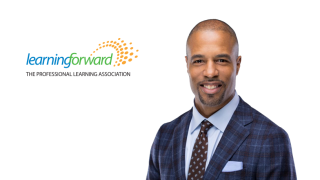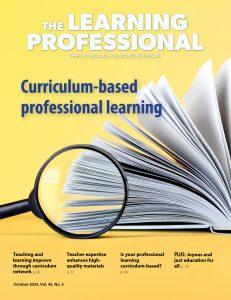As states prepare the first drafts of their consolidated plans as required by the Every Student Succeeds Act (ESSA), I encourage them to recognize the powerful opportunity this new law provides to rethink their learning systems. States can leverage all funding streams to advance a coherent vision of continuous learning and improvement — one grounded in the new definition of professional development outlined in the law, and one that will enable them to achieve ESSA’s goals of equity and excellence.
I am also confident that those educators who understand and appreciate the importance of continuous learning and improvement in ensuring success for every student will be the most passionate and articulate spokespersons for the definition and the system necessary to support it. At the school level, this new definition envisions teams of teachers who share collective responsibility for students engaging in continuous cycles of learning and improvement that enable all students to master or exceed high standards of performance.
The definition describes that learning as sustained, research-based, classroom-focused, and job-embedded. The learning that occurs within and across teams of educators meets the newly required standards of evidence and effectiveness and provides the essential foundation for growth and improvement of educators and their students.
To make this a reality for all educators, every school must be a learning school and every school system a learning system. State education agencies must ensure that this is the goal for any new policies and practices they develop. This will include advancing a shared vision for learning systems at all levels, prioritizing building leadership capacity, allocating resources in new ways, using data for planning and evaluation purposes, and implementing and managing the change process.
Unfortunately, we have heard from stakeholders that a few states are giving little attention to these issues. Due to the limited attention to professional development within the proposed regulations and guidance, it is understandable. Yet we all know that no state will achieve its goals absent an effective continuous improvement strategy. Congress did not include the term professional development in the law more than 65 times for states to ignore their responsibilities for it, and they did not write the phrase evidence-based more then 60 times for the same response.
While the most effective educator learning and improvement take place at the school level, there are at least three things states can do to ensure the equitable access to quality experiences and support for all educators.
- Identify criteria that must be addressed before any professional learning is approved and funded. More than 35 states have adopted Learning Forward’s Standards for Professional Learning or their own guidelines that provide the essential conditions and qualities of professional learning that leads to change in practice and performance by educators and students. States must hold all professional learning to their own evidence-based guidelines.
- Determine what and how data will be collected to monitor the quality and assess the impact of professional development educators experience. Data collection and learning from professional learning implemented is foundational to the professional learning cycle described in the definition. With this data, we will continue to learn what is working — and what is not. With this data, we can keep our commitment to equity and excellence because we will know whether all educators are getting the support they need to achieve the outcomes.
- Establish a feedback system to inform an improvement process. Continuous improvement is another underlying theme in ESSA. When states engage educators affected by its policies and regulations, they can learn what is working and where improvements can be made. Ongoing stakeholder engagement processes will improve the policy-to-practice link.
Research has shown that professional learning, when designed and implemented well, improves educator performance and student learning. And whether we focus on implementing new college- and career-ready standards, higher-quality early learning, or turning around persistently failing schools, building educators’ capacity will be a necessary core strategy to achieve these outcomes.
This post originally appeared in Learning Forward’s PD Watch.






